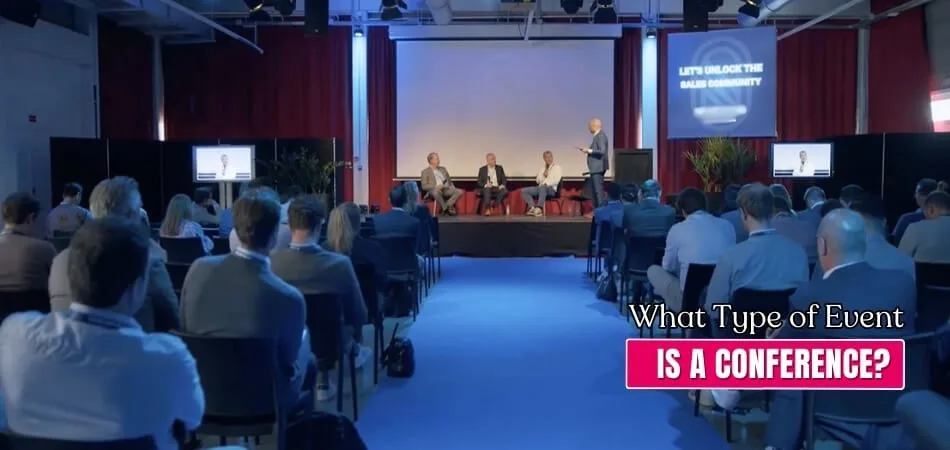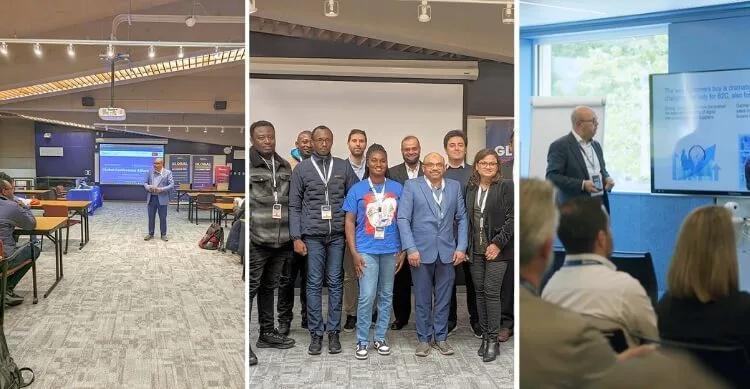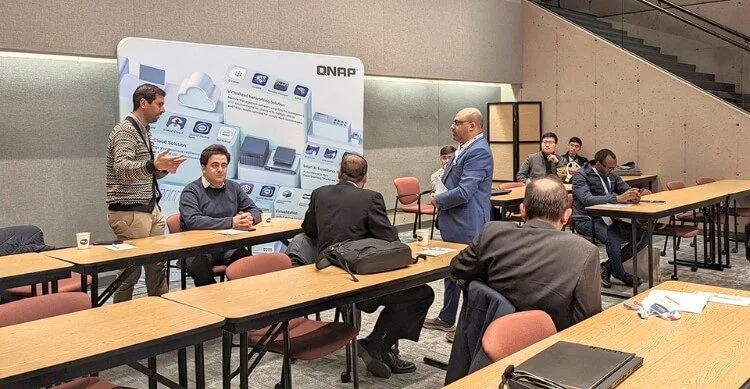A conference is an essential event that brings together professionals, industry pros, and experts from a specific field for an exchange of ideas, networking, and discussion on the latest developments. However, you might wonder, what type of event is a conference?
Well, it is a large-scale event centered around a particular theme, topic, or industry, designed to facilitate the sharing of insights, the building of professional networks, and the exploration of recent trends and advancements relevant to its main focus.
Continue reading to discover more about the world of conferences, including how they can benefit your professional life and the latest trends shaping these events.
The Basics of a Conference
Conferences serve as a platform for minds to exchange ideas and innovations. They unite people from various sectors to discuss themes and developments that matter. Such gatherings are essential for building connections and pushing industries forward.
At these comprehensive events, participants dive into a rich learning environment filled with workshops, keynote addresses, and panel discussions. Each of these activities is carefully crafted to spark inspiration and encourage in-depth discussion among attendees. This is especially true for global events like conferences in Canada, USA, or any other country’s conference where diverse professionals come together to engage meaningfully with the content.
Professionals seeking to expand their knowledge and networks greatly benefit from attending different types of conferences. Taking part in these events provides a unique opportunity to gain insights, exchange expertise, and meet potential partners or collaborators. Individuals can substantially boost their professional skills and connections by attending conferences, which makes them a cornerstone of professional development.
What Type of Event is a Conference?
Conferences are large-scale events where experts, professionals, and enthusiasts come together to discuss a specific theme or topic. The event is structured to encourage ideas, provide networking opportunities, and explore new trends and advancements. Conferences are vital in industries because they bring people together to share insights, learn from each other, and build lasting professional relationships.
Conferences provide an ideal environment where participants can engage with thought leaders and innovators in their field. The event offers structured sessions, such as keynote speeches and panel discussions, focused on the latest developments and challenges. Attendees leave the conference with a deeper understanding of the subject matter and valuable contacts to help them grow professionally.
The main purpose of a conference is to educate, inspire, and connect like-minded individuals. The event creates an atmosphere of learning, where new ideas are explored, and existing ones are challenged. By attending a conference, professionals stay ahead in their industry and find inspiration to implement fresh strategies in their work.
Attendance at Conferences – What Attracts Them?
- Networking Opportunities: Conferences allow professionals to meet and connect with others in their field, creating valuable relationships and collaborations.
- Educational Sessions: Participants attend workshops and presentations designed to provide practical knowledge and insights into industry trends.
- Access to Experts: Attendees have the opportunity to learn directly from industry leaders, gaining valuable perspectives on current challenges and innovations.
- Innovative Ideas: Conferences are a hub for fresh ideas, offering attendees new approaches and creative solutions to apply to their work.
- Conference Theme: The central theme drives the focus of the event, ensuring that all sessions align with the purpose of the conference.
- Industry Updates: Participants stay informed about the latest trends and developments, keeping them competitive and knowledgeable in their field.
- Professional Development: Conferences offer opportunities for personal growth by providing new skills and knowledge that boost career prospects.
- Collaborative Environment: The event supports collaboration among professionals, encouraging the exchange of ideas and the development of new partnerships.
Professionals across industries benefit from conferences as a source of inspiration and opportunity. By raising a culture of continuous learning and collaboration, they ensure that attendees leave energized and enriched.
Types Of Conferences People Can Explore
The world of conferences offers a gateway to new knowledge, connections, and insights across a range of fields. Meetings like these cater to a wide range of interests, industries, and professional levels.
Here are some types of conferences that individuals can attend to enrich their professional development.
Academic Conferences
Academic conferences bring together researchers, scholars, and academics to discuss recent findings and theories. These events often focus on presenting papers and engaging in scholarly debate. Attendees can expect to expand their knowledge base and find collaboration opportunities. They’re ideal for those involved in research and higher education.
Industry Conferences
Industry conferences focus on specific sectors, such as technology, healthcare, or finance. They feature product launches, case studies, and market trends discussions. Professionals attend to stay abreast of industry developments and network with peers. Such events are pivotal for career advancement within a field.
International Business Conference
An international business conference provides a platform for global networking and cross-cultural exchanges. Participants explore international market trends, investment opportunities, and regulatory challenges. These gatherings are crucial for businesses looking to expand globally. They offer a unique perspective on global economic dynamics.
Trade Shows
Trade shows combine exhibitions with conference elements, showcasing products and services. They’re an opportunity to see the latest innovations firsthand and meet suppliers or customers. Networking at trade shows can lead to partnerships and sales opportunities. They’re particularly valuable for sales and marketing professionals.
Workshops and Seminars
Workshops and seminars focus on skill development and knowledge sharing in a more interactive setting. These events are usually shorter and more specialized, ideal for deep dives into specific topics. Attendees leave with practical skills and insights that can be immediately applied. They cater to professionals looking to refine their expertise.
Networking Conferences
Networking conferences prioritize making connections over specific content themes. They feature mixers, meet-and-greets, and speed networking sessions. These events are perfect for building a professional network and finding mentors or collaborators. They’re essential for professionals at all career stages.
Virtual Conferences
Virtual conferences have gained prominence, offering access to global content without the need to travel. These online events include webinars, virtual networking, and digital exhibitions. They provide a flexible and accessible way to engage with content and communities. Virtual conferences are ideal for those seeking to balance ongoing education with busy schedules.
How to Make the Most of Your Conference Experience?
An experience like attending a conference can be transformative, offering unprecedented opportunities for learning, networking, and professional development. To fully benefit, a strategic approach is essential.
Here’s a step-by-step guide to ensure you make the most of your conference experience.
Step-1. Set Clear Objectives
Before attending, identify what you wish to achieve. Whether it’s learning new trends, networking, or finding job opportunities, having clear goals guides your focus. This preparation ensures you attend the right sessions and engage with relevant individuals.
Step-2. Research Speakers and Sessions
Investigate the conference agenda in advance. Familiarize yourself with the speakers and their topics to prioritize sessions that align with your interests. This knowledge enables you to ask insightful questions and make meaningful connections.
Step-3. Network Strategically
Conferences are networking goldmines, but aim for quality over quantity. Target networking with individuals and companies that align with your professional goals. Introduce yourself, exchange contact information, and follow up post-conference to build lasting relationships.
Step-4. Participate Actively
Engage actively in sessions by asking questions and contributing to discussions. Participation not only enriches your learning experience but also increases your visibility among peers. It’s an opportunity to share your knowledge and perspectives.
Step-5. Take Detailed Notes
Document key takeaways from each session. Notes serve as a valuable reference for implementing new ideas and sharing insights with your team or network. They help in retaining information and facilitating post-conference reflection.
Step-6. Follow Up
After the conference, follow up with the contacts you’ve made. Send personalized messages recalling your conversation and expressing interest in staying in touch. This step is crucial for nurturing new professional relationships and exploring potential opportunities.
Step-7. Reflect and Act
Post-conference, take time to reflect on your learnings and experiences. Identify actionable steps you can take to apply your new knowledge and insights. Implementing what you’ve learned is key to maximizing the conference’s value.
By following these steps, you can transform your conference experience into an opportunity for personal and professional development. Remember, the true value of a conference lies not just in attendance, but in how you leverage the opportunities it presents.
Frequently Asked Questions about What Type of Event is a Conference?
Here are some of the FAQs and their relevant answers for a clear concept about what type of event is a conference:
How Are Conferences Different from Seminars?
Conferences typically involve multiple sessions, speakers, and attendees discussing various topics, while seminars are usually more focused and involve a smaller group discussing a single subject in depth.
Who Organizes Conferences?
Conferences are organized by various entities, including corporations, educational institutions, professional associations, government agencies, and nonprofit organizations.
How Do Conferences Benefit Attendees?
Attendees can gain valuable insights, stay updated on industry trends, establish professional connections, discover new opportunities, and enhance their skills and knowledge through conference participation.
What Are the Key Components of A Conference?
Key components include keynote presentations, panel discussions, workshops, poster sessions, networking opportunities, and exhibitor booths.
How Do Speakers Get Selected for Conferences?
Speakers are often selected based on their expertise, relevance to the conference theme, and their ability to engage and educate the audience.
Are Conferences only Held In-Person?
While traditional conferences are typically held in-person, there is an increasing trend towards virtual conferences, especially in light of technological advancements and global connectivity.
How Can One Participate in A Conference?
Participation usually involves registering for the event, either as an attendee, speaker, exhibitor, or sponsor, depending on individual goals and interests.
Conclusion
As we journey through the dynamic world of conferences, we discover how crucial they are to fostering professional growth and innovation. These events serve as vital platforms for knowledge sharing, networking, and exploring the latest industry trends.
In discussing what type of event is a conference, it becomes clear that these gatherings are crucial to stimulating innovation and facilitating the exchange of innovative ideas. They serve as an active platform where individuals can connect with peers, learn from industry leaders, and stay updated on the latest trends.
The essence of a conference lies in its ability to bring together like-minded individuals from across the globe, providing rich soil for the seeds of future collaborations and advancements. Choosing and participating in conferences aligned with one’s professional goals can help attendees propel their careers forward.








